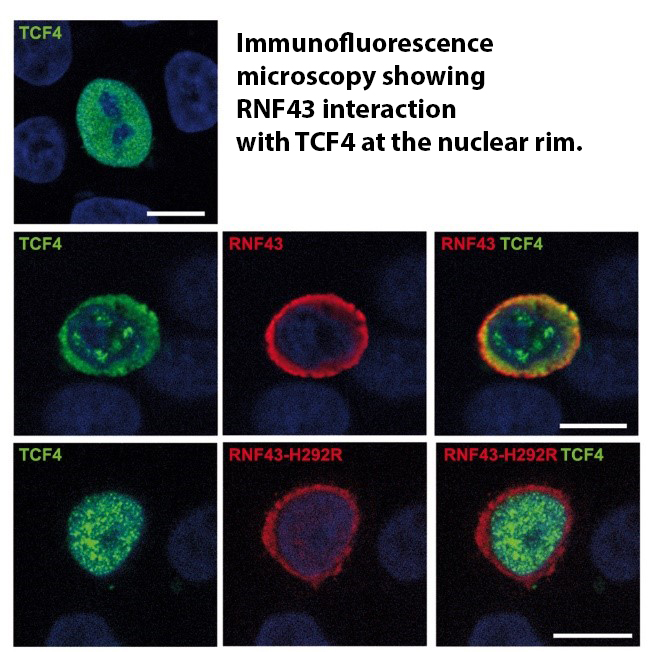Function of the tumor suppressor RNF43 and gastrointestinal carcinogenesis
The canonical Wnt signaling pathway is essential in developmental processes and plays a crucial role in the regulation of epithelial stem cell self-renewal. Deregulation of this pathway is associated with carcinogenesis, particularly in the gastrointestinal tract. We identified a target gene of the Wnt signaling pathway, RNF43, which is selectively expressed in intestinal stem cells and is overexpressed in colorectal adenomas and a subset of colorectal cancers. Overexpression of RNF43 was shown to inhibit Wnt signaling in colon cancer cells by impairing Frizzled receptor turnover. Interestingly, we found an alternative mechanism of RNF43-mediated Wnt inhibition downstream of (mutated) β-catenin. Thus, RNF43 sequesters TCF4 to the nuclear membrane, dampening the transcription of important Wnt target genes (Loregger et al. Sci Signal. 2015). Mutations in RNF43 have been identified in several tumor types, suggesting an important role for RNF43 as a tumor suppressor gene. Indeed, depletion of RNF43 expression in colon and gastric cells increases their tumorigenic potential (Neumeyer et al. Carcinogenesis 2019). To further explore the function of RNF43 we have generated two mouse models expressing mutated Rnf43, which we are currently analyzing in different experimental settings.

Publications
Neumeyer V, Brutau-Abia A, Allgäuer M, Pfarr N, Weichert W, Falkeis-Veits C, Kremmer E, Vieth M, Gerhard M, Mejías-Luque R. Loss of RNF43 Function Contributes to Gastric Carcinogenesis by Impairing DNA Damage Response. Cell Mol Gastroenterol Hepatol. 2020 Nov 11;11(4):1071-1094. (Full text(link is external); Abstract(link is external))
Neumeyer V, Vieth M, Gerhard M, Mejías-Luque R. Mutated Rnf43 Aggravates Helicobacter Pylori-Induced Gastric Pathology. Cancers (Basel). 2019 Mar 16;11(3). pii: E372. (Full Text(link is external); Abstract(link is external))
Neumeyer V, Grandl M, Dietl A, Brutau-Abia A, Allgäuer M, Kalali B, Zhang Y, Pan KF, Steiger K, Vieth M, Anton M, Mejías-Luque R, Gerhard M. Loss of endogenous RNF43 function enhances proliferation and tumour growth of intestinal and gastric cells. Carcinogenesis. 2019 Jun 10;40(4):551-559. (Full Text(link is external); Abstract(link is external))
Quintana I, Mejías-Luque R, Terradas M, Navarro M, Piñol V, Mur P, Belhadj S, Grau E, Darder E, Solanes A, Brunet J, Capellá G, Gerhard M, Valle L. Evidence suggests that germline RNF43 mutations are a rare cause of serrated polyposis. Gut. 2018 Jan 12. (Full Text(link is external); Abstract(link is external))
Loregger A, Grandl M, Mejías-Luque R, Allgäuer M, Degenhart K, Haselmann V, Oikonomou C, Pantelis Hatzis, Janssen KP, Nitsche U, Gradl D, van den Broek O, Destree O, Neumaier M, Kalali B, Jung A, Varela I, Schmid RM, Rad R, Busch DH and Gerhard M. The stem-cell E3 ligase RNF43 displays a novel mode of Wnt inhibition downstream of (mutated) β-catenin, which is disrupted in tumors bearing RNF43 mutations. Science Signaling 2015 Sep 8;8(393):ra90. (Full Text;(link is external) Abstract)(link is external)

